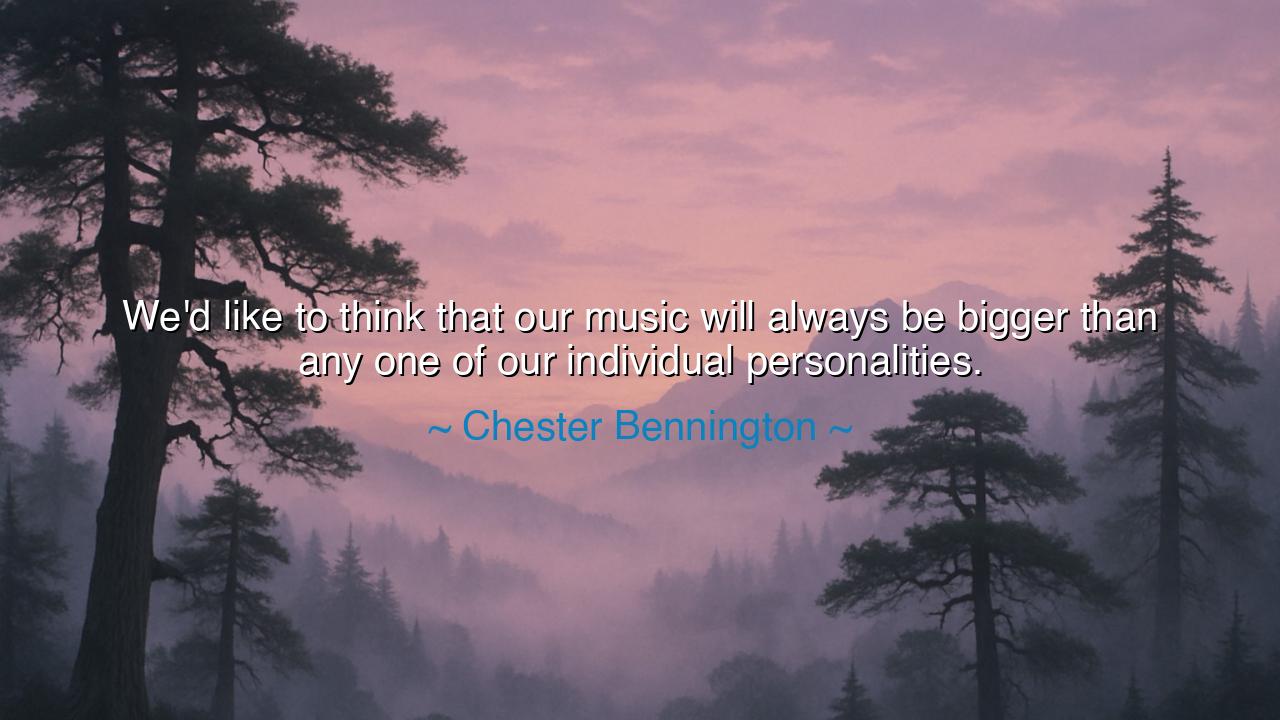
We'd like to think that our music will always be bigger than any
We'd like to think that our music will always be bigger than any one of our individual personalities.






Hear the solemn words of Chester Bennington, the voice of anguish and hope, who declared: “We’d like to think that our music will always be bigger than any one of our individual personalities.” In this humble utterance is revealed a truth not only of musicianship, but of life itself—that the truest creations, born of sincerity and passion, must transcend the fragile vessel of the individual and live on as eternal gifts to humanity.
When Chester speaks of music, he does not mean only the melodies and rhythms of Linkin Park, but the force of art itself—art that rises above the ego of the creator and becomes the property of the world. Personalities fade, reputations shift, and individuals pass away. Yet when a work carries the weight of honesty and speaks to the depths of the human heart, it becomes larger than its maker, taking on a life of its own. It is no longer the song of one man or one band, but the song of millions who hear themselves reflected within it.
The meaning of bigger than personality is humility before the work itself. Many artists stumble when their fame becomes greater than their art, when their ego eclipses their creation. Chester and his companions desired the opposite—that their art might outlast their faces, that their songs might remain even when the world had forgotten their names. This desire echoes the ancient pursuit of immortality, not through stone monuments or crowns, but through expressions that endure in the hearts of men.
History bears witness to this truth. Consider the plays of William Shakespeare. His personality, his private life, and even his true identity remain clouded in mystery. Yet his words still breathe upon the lips of kings and children alike, centuries after his death. His art has become larger than himself, a river that still flows though the man is gone. So too did Chester hope that Linkin Park’s music would remain, carrying messages of pain, healing, and resilience long after the voices that first sang them had fallen silent.
The power of this teaching is also found in the universality of struggle. Chester’s music, woven with themes of grief, anger, alienation, and hope, resonated not because of who he was as an individual, but because countless souls recognized themselves within the sound. When a person hears truth in music, they cease to hear the singer’s personality and begin to hear their own story. Thus, the music becomes bigger than the self, transforming into a mirror for humanity’s shared emotions.
O children of tomorrow, take this lesson: let your work, your art, your service, be greater than your name. Do not live only for reputation or recognition, for these fade like smoke in the wind. Instead, pour your truth into what you create. If you build, build with love; if you write, write with honesty; if you lead, lead with integrity. In this way, your works will endure when your face is forgotten, and your impact will ripple through generations.
Let your practice be this: detach from vanity and devote yourself to the higher purpose of your labor. Ask not, “Will they remember me?” but rather, “Will what I create help, heal, or inspire when I am gone?” For this is how ordinary lives become extraordinary, how fleeting moments become eternal. Chester’s words are a reminder that the greatest legacy is not the fame of the artist, but the permanence of the art.
So remember always his saying: music must be larger than personality, and truth larger than ego. When we strive to serve something greater than ourselves, we create works that live beyond our span. And though the singer may fall silent, the song shall never die.






AAdministratorAdministrator
Welcome, honored guests. Please leave a comment, we will respond soon